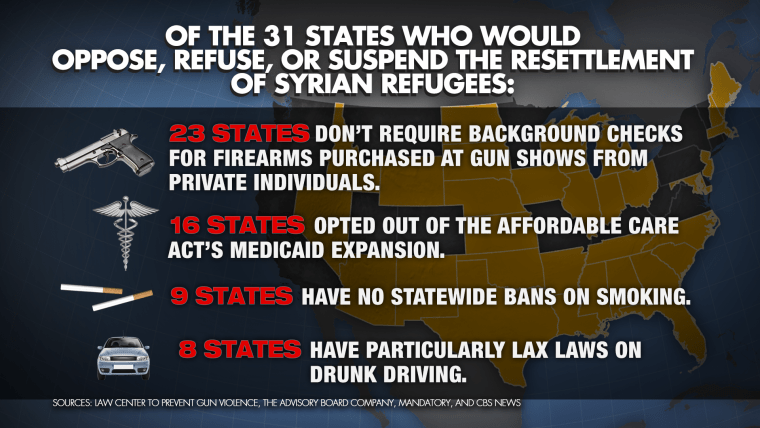More than three-fifths of the country’s governors won’t accept Syrian refugees into their states in the name of public safety. But just how safe are these states?
In response to concerns that one of the terrorists responsible for last week’s deadly attacks on Paris came to France by way of Greece -- the same journey undertaken by hundreds of thousands of Middle Eastern migrants in the past year -- 31 governors have so far said they would oppose, refuse or suspend the resettlement of Syrian refugees.
The move flies directly in the face of the Obama administration’s pledge to accept 10,000 refugees in the next fiscal year and breaks down largely along party lines. All of the governors standing against Syrian refugees -- either temporarily or permanently -- are Republican, save for one.
The White House has stressed in response that the process for screening refugees is very thorough, taking anywhere between 18 and 24 months. Most of the estimated 2,000 who have so far made it through are highly vulnerable to persecution, and are often women and children.
While governors claim they are acting in an abundance of caution, many of their states are home to other far more pressing safety threats. Here are some of the areas in which existing laws arguably create more of a threat to Americans’ physical safety than the acceptance of Syrian refugees ever could:
RELATED: Jeb Bush fumbles refugee question

Guns
According to the Law Center to Prevent Gun Violence, 23 states whose governors are opposing the resettlement of Syrian refugees do not require background checks for firearms purchased at gun shows from private individuals. This so-called “gun show loophole” allows for buyers to skirt federally mandated background checks that cover sales conducted by licensed dealers, and has been a prime target for gun control advocates in recent years. As the gun control group Everytown for Gun Safety states on its website, “[r]equiring a criminal background check for all gun sales is the single most effective policy for keeping guns out of the hands of dangerous people and saving lives.”
Medicaid expansion
Sixteen states whose governors are opposing, refusing, or suspending the resettlement of Syrian refugees have opted out of the Affordable Care Act’s Medicaid expansion, leaving millions of people uninsured. According to a recent Harvard University study, states’ refusal to expand Medicaid will lead to 17,000 premature and avoidable deaths.
Smoking
Nine of the states whose governors are opposing, refusing or suspending the resettlement of Syrian refugees have no comprehensive statewide bans on smoking in workplaces, restaurants and bars. The Centers for Disease Control and Prevention (CDC) ranks smoking as “the leading cause of preventable death," responsible for more than 480,000 deaths per year in the U.S., including nearly 42,000 deaths resulting from secondhand smoke exposure.
Drunk Driving
Almost 30 people die every day in the U.S. in car crashes that involve an alcohol-impaired driver, according to the CDC. But in a recent report from Mothers Against Drunk Driving, 14 states have particularly lax laws covering a range of safety precautions -- including immediate confiscation of licenses for DUI offenders, sobriety checkpoints, and penalties for DUI child endangerment, among others. Eight of those states have governors who are opposing, refusing or suspending the resettlement of Syrian refugees into their state.
Domestic Violence
Domestic violence remains a major problem from coast to coast, with over 10,000 unmet requests for help in a single 24-hour period, according to the National Network to End Domestic Violence’s latest census of domestic violence services. But one state in particular stands out for its lenient approach to abusers: South Carolina.
The Palmetto State, whose governor asked the State Department to be excluded from refugee resettlement, was the subject of a massive series last year from the Charleston Post and Courier that exposed shortcomings in protecting victims of domestic abuse. More 300 women have been killed by their partners in South Carolina over the past decade, the report found. But the state’s legal system carried a tougher penalty for animal torture (up to five years in prison) than for beating a wife or girlfriend on a first offense (maximum of 30 days in jail.)
Gov. Nikki Haley signed a law in June implementing tougher penalties for domestic abuse, among other provisions. The new law carries up to 90 days in jail for the first offense.